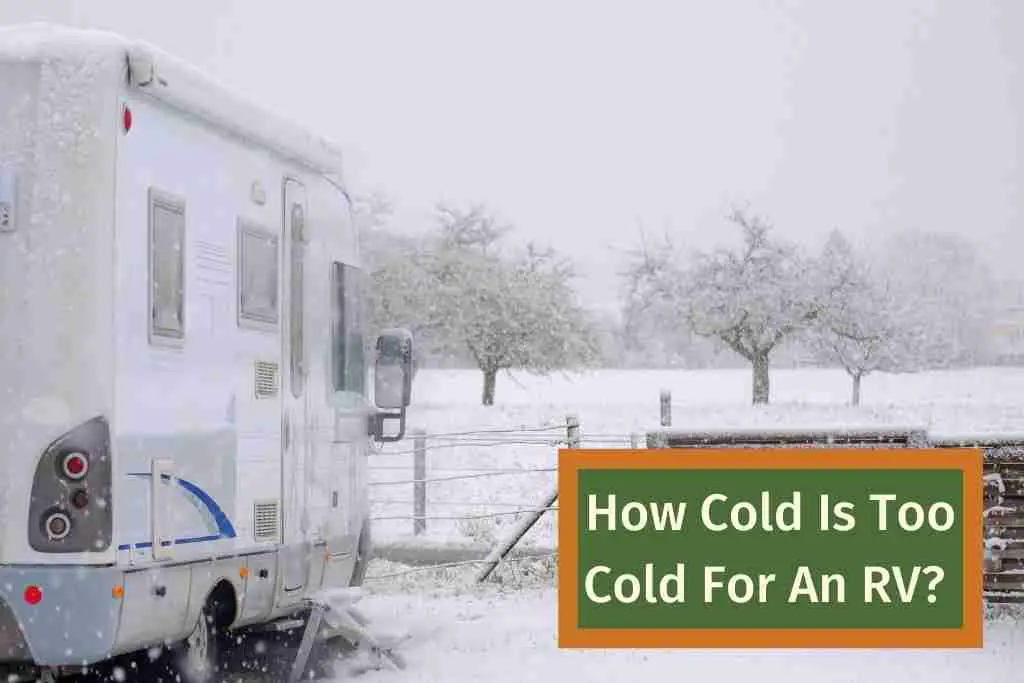Camping in an RV is a great experience—whether you prefer mountains or sandy beaches, traveling in an RV allows you to see the most beautiful parts of the world. You can even spend time traveling in your RV during the winter as long as you take the proper steps. But how do you know when it’s too cold to take your RV out adventuring?
It’s too cold for your RV if its pipes are at risk of freezing. When pipes freeze, they burst—causing a lot of damage and headaches. Your RV pipes can freeze if they are exposed to temperatures below 32 degrees Fahrenheit for an extended period of time.
Keep reading to learn more about how to know when it’s too cold for your RV and how to protect it during extremely cold temperatures.
How Cold Is Too Cold For Camping In An RV?
There are a multitude of factors that go into deciding if it’s too cold to camp in an RV. Let’s discuss a few of them.
Will you be using water while you’re camping? If the answer is yes, you’ll need to carefully consider the temperature. The pipes in your RV can easily freeze in temperatures below 32 degrees Fahrenheit. If it dips below 20 degrees, your pipes are especially susceptible. Your pipes will need to be insulated and heated, which leads to the next question.
Do you have a reliable heat source in your RV? If you can keep your RV warm in cold temperatures, your pipes will be less likely to freeze and you’ll still be able to camp.
This is especially true if your water tanks are above the floor of your RV. If they are in the underbelly of the RV with no heating, it’ll be more difficult to keep them warm.
Of course, your personal comfort level also comes into play when deciding when it’s too cold to camp in an RV. If you don’t want to have to stress about keeping your pipes warm, adding antifreeze to your black tanks, or regularly sealing any gaps in your RV, it’s best to leave your RV adventures for the warm weather summertime brings.
Can RVs Handle Cold Weather?
RVs can handle cold weather as long as they are properly equipped. If the tanks in your RV are insulated or heated, they’ll be do well in cold temperatures. A properly-maintained RV that runs well will do better in cold conditions than one in poor condition; if your RV’s engine struggles to start on the nicest of days, it may fail you when temperatures drop.
If you’re planning to spend a lot of time camping in colder weather, try to find an RV that is in good running condition, well-insulated, and free from leaks. This added effort upfront will payoff tenfold when you don’t have to struggle to keep your pipes from freezing. If you do this you can even live in your RV during the winter.
How To Protect Your RV During Low Temperatures
Even if your RV isn’t naturally well-equipped to handle cold temperatures, there are steps you can take to make sure it remains unharmed by inclement weather.
First, make sure you have your RV heated to a comfortable temperature—ideally, somewhere around 70 degrees Fahrenheit. Open the cupboard doors beneath each sink so that the warm air can come into contact with the pipes, keeping them warm. This is one of the easiest, and most cost-effective, ways to keep your RV safe during a cold snap.
You can also apply heat tape to the exposed pipes in your RV. Heat tape will supply heat to the pipes when the temperature drops so that they won’t freeze. This method is helpful because it doesn’t require very much effort on your part—just set the heat tape up initially and you’re good to go.
Another simple way to protect your RV during low temperatures is to add specially-formulated RV antifreeze to your black water tank. This antifreeze will keep the liquids in your black tank from freezing. Be sure not to add the antifreeze to your fresh water tanks, however, as it will contaminate your drinking water.
This is a helpful article about what you can leave in your RV during winter.
What Temperature Is Too Cold For A Travel Trailer?
Much like RVs, travel trailers are at risk of freezing pipes once temperatures are below 32 degrees Fahrenheit. However, many travel trailers have less insulation than RVs, so they will be more susceptible to cold temperatures. This means they’ll often require more upkeep to make sure the pipes don’t freeze.
Thankfully, you can purchase a four season travel trailer to make winter camping easier. A four season travel trailer will typically have more insulation, less gaps between windows and doors, and an insulated or heated underbelly. All of these features help to keep energy costs low and pipes appropriately warm.
Final Thoughts
There is no definitive answer to how cold is too cold for an RV, as everyone’s individual comfort level will vary. However, we generally believe that a temperature below 32 degrees Fahrenheit is too cold for an RV. This is especially true if the RV is equipped with water pipes.


